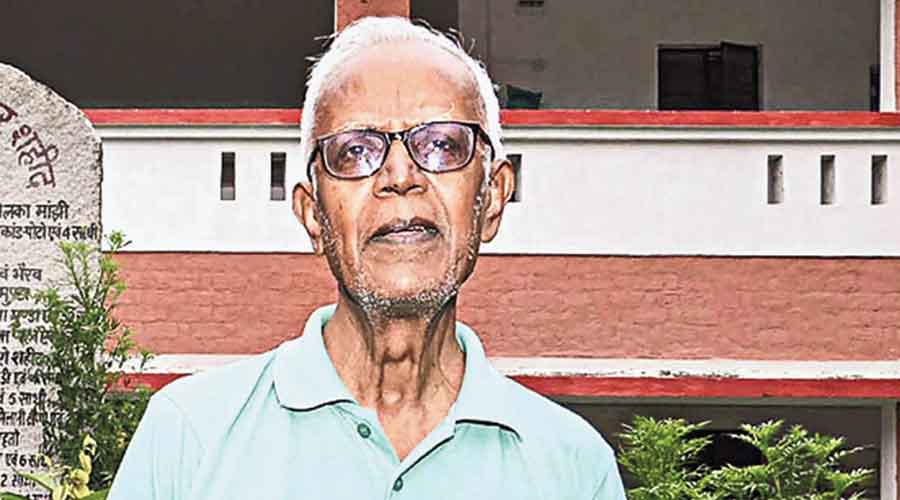At the beginning, Father Stan Swamy appears on screen to say that what is happening to him is not happening to him alone. The film ends with the Jesuit declaring he is “ready to pay the price, whatever it may be”.
An emotive yet simple narrative of the nearly four-year-old Elgaar Parishad case and the 16 rights activists, writers and lawyers arrested in connection with it was to release at an online film festival on Saturday night.
The documentary, BK16 and the Incarceration of Justice, is about the detainees, who have come to be known as the “Bhima Koregaon 16” after the place near Pune where caste violence broke out during an Ambedkarite pilgrimage in 2018.
One of the 16 — Father Stan, a Jesuit and tribal rights defender from Jharkhand – died of Covid-related complications in custody in July. The investigators have linked the accused to a Maoist plot.
Produced by the Delhi-based NGO Karwan-e-Mohabbat, the 13-minute film edited and narrated by Anam Sheikh starts with the funeral service of the 84-year-old Father Stan.
After a short introduction, Father Stan is shown in a video — recorded before his arrest in Ranchi last October — saying: “What is happening to me is not something unique happening to me alone. It is the broader process taking place all over the country.”
He then briefly speaks about the widespread arrests of intellectuals in the case, which many see as a government crackdown on dissenters.
Among the accused, Telugu litterateur Varavara Rao, Delhi University teacher Hany Babu M.T. and balladeer Jyoti Jagtap too contracted Covid. Rao, who is almost 81, is out on bail.
The film’s creative producer, Natasha Badhwar, said the documentary was an attempt to refresh public memory and highlight the detainees’ plight.
“It is our response to the wrongful incarceration of the BK16, including Fr Stan Swamy, and the many others arrested during the pandemic, the lack of medical care, and the Arsenal report that shows evidence was planted on many of the accused. (It’s) also to answer the question: what really happened at Bhima Koregaon?” Badhwar said.
A US-based data forensics firm, Arsenal Consulting, has claimed that “evidence” was planted on the computers of two of the accused — Delhi-based human rights activist Rona Wilson and Nagpur lawyer Surendra Gadling — through malware.
Both the National Investigation Agency, which is probing the case, and the Maharashtra police which had started the investigation, have opposed the admission of Arsenal’s reports in Bombay High Court.
The film quotes Father Stan, a patient of Parkinson’s Disease, from the court hearings to highlight how his health had deteriorated during his eight months in Navi Mumbai’s Taloja jail.
It shows footage of rights activist Umar Khalid, who’s not among the BK 16 and is in jail custody in Delhi on terrorism charges, accused of inciting the February 2020 Delhi riots through his protests against the new citizenship regime.
Umar had attended the Elgaar Parishad event in Pune on December 31, 2017, and spoken about the historic importance of the 1818 Battle of Koregaon, in which a largely Dalit army had defeated the Peshwas.
It’s on January 1, 2018 —the bicentennial of the Battle of Koregaon, which the Elgaar Parishad event was remembering — that the Bhima Koregaon caste clash that killed a man took place.
Interviews of Hany Babu, legal activist Sudha Bharadwaj, and cartoonist and lawyer Arun Ferreira — all BK16 members — are also shown.
The counter-narrative from the prosecutors and Tushar Damgude — the Pune businessman whose police complaint started the case — is absent.
“Because of the pandemic and the restrictions on movement, we were unable to speak to anybody in Pune,” Badhwar explained.
“We have put together facts that are already in the public domain, and put them in one place to answer questions like who filed the first FIR? How long did the police take to act on the FIRs filed by the Dalit activist (Anita Sawale) as well as the Hindutva groups? Who were the accused (of the caste violence, Sambhaji Bhide and Milind Ekbote) and how they were initially not arrested, and have still not been chargesheeted.”
Sawale had accused Bhide and Ekbote — who have been linked to the Sangh parivar —of engineering the caste violence. Ekbote was arrested briefly before securing bail.
The BK16 documentary ends with Father Stan saying: “I am happy to be part of this process because I am not a silent spectator. I am part of it, part of the game and ready to pay the price, whatever it may be.”










